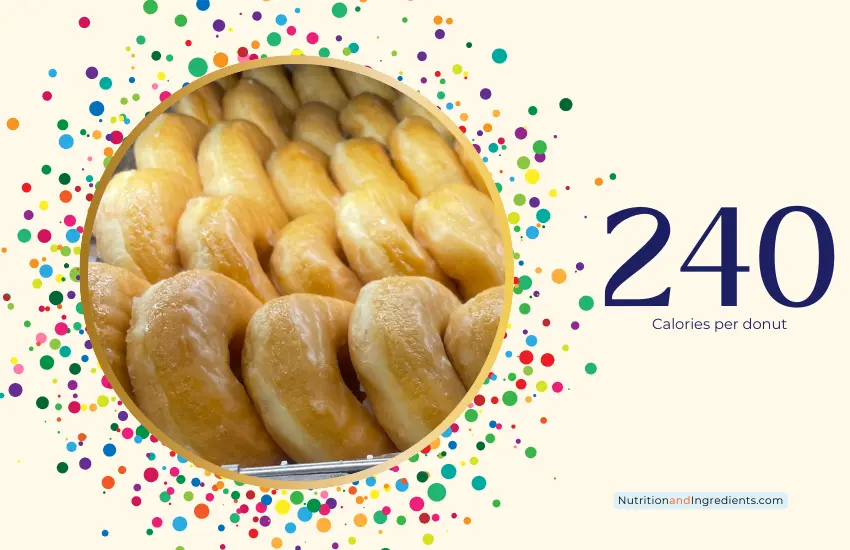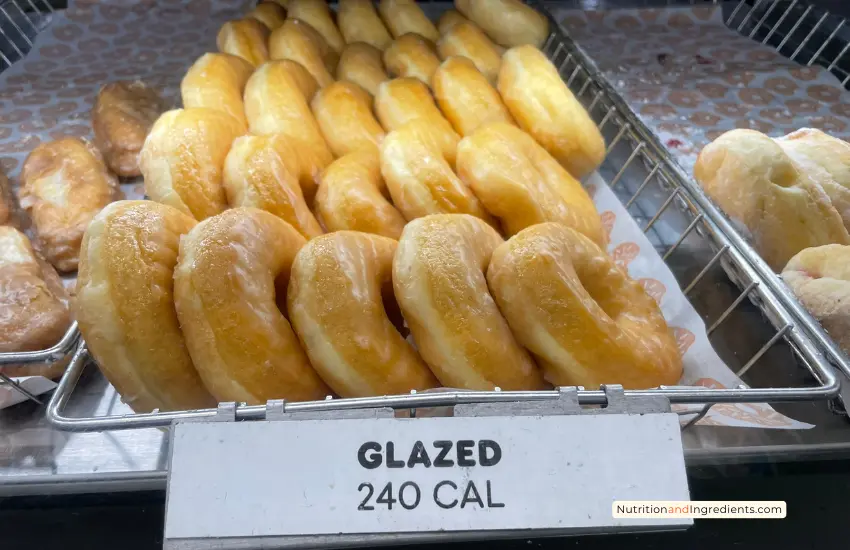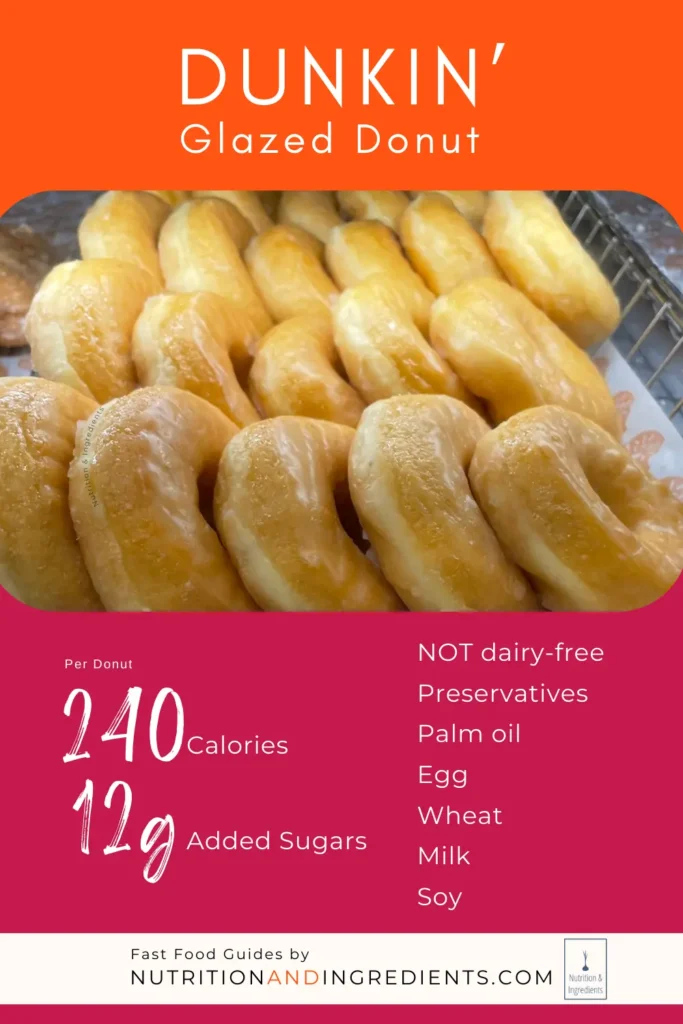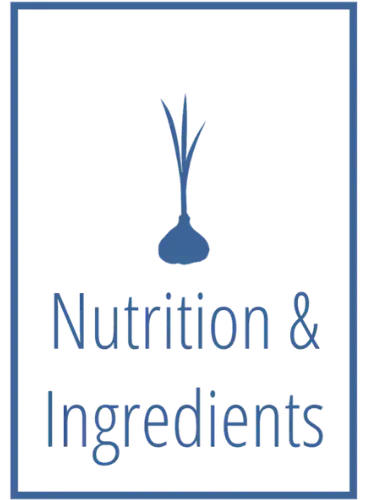Dunkin’ Glazed Donut

A Dunkin’ Glazed donut has 240 calories, 11 grams fat, 33 grams carbohydrates, and 4 grams protein.
Read this report for a complete overview of the nutrition facts, calories analysis, ingredients, and allergens in a glazed donut from Dunkin’ Donuts.
Dunkin’ Glazed Donut Nutritional Information
Nutrition facts are based on a single serving measured as one donut.
Daily Value
Daily value (%DV) indicates the amount of a specific nutrient in the donut, relative to the recommended daily limit. Use %DV to compare foods and select the best option for your dietary goals.
Review the chart below, which shows that Dunkin’s glazed donut is high in saturated fat and added sugars.
Serving size: 1 Glazed Doughnut
% DAILY VALUE
Use %DV to determine if the level of nutrients in a food is low (5% or less) or high (20% or more).
|
%DV |
Level | |
|---|---|---|
|
Saturated Fat |
23% |
HIGH |
|
Sodium |
12% |
MED |
|
Added Sugars |
24% |
HIGH |
%DV based on 2,000 calories
Calories
There are 240 calories in a single glazed donut from Dunkin’ Donuts.
Here is a summary of calories by macronutrient, per donut:
Over half of the total calories are derived from carbohydrates (see section on sugars below). Dietary fat makes up about 42% of the total calories and the remaining 4% is from protein.
Dunkin’ Glazed Donut
% calories from fat, carbs and proteinThe summary above of calories by nutrient is a rounded estimate based on the nutrition facts provided by Dunkin’ Donuts fast food restaurant.

FITNESS TIME TO BURN 240 CALORIES
Fats and Sugars
One glazed donut from Dunkin’ has 11 grams of total fat, including 4.5 grams saturated fat.
The amount of saturated fat in a single donut exceeds a 20% daily value for an individual following a 2,000 calorie daily diet. That is considered high.
SUMMARY OF FAT PER SERVING
Dietary Guidelines for Americans, set by the Department of Health and Human Services, recommend limiting calories from saturated fat to no more than 10% of total calories.
The 4.5 grams of saturated fat account for about 17% of the total calories.
Note: Saturated fats are found in baked goods, vegetable shortening, dairy products, and processed meats, among other food items. The FDA recommends choosing foods lower in saturated fat.
Total Sugars
Carbohydrates contribute the greatest proportion of total calories. The 33 grams of carbs includes one gram dietary fiber and 12 grams added sugars, which is high for a single menu item.
According to the FDA, “added sugars are a nutrient to get less of.”
Approximately 50 calories are derived from added sugars in a glazed donut.
While sugars are found naturally in various fruits, vegetables, and dairy products, added sugars are added to processed foods. Added sugars include sucrose, dextrose, syrups, and honey.

Nutrition Facts
Amount per Glazed Doughnut
Red indicates %DV is high.
|
Calories |
240 |
|
%DV | ||
|
Total Fat |
11g |
14% |
|
Saturated Fat |
4.5g |
23% |
|
Trans Fat |
0g | |
|
Cholesterol |
0mg |
0% |
|
Sodium |
270mg |
12% |
|
Carbohydrates |
33g |
12% |
|
Dietary Fiber |
1g |
4% |
|
Total Sugars |
13g | |
|
Added Sugars |
12g |
24% |
|
Protein |
4g |
%DV based on a 2,000 calorie diet. Calorie needs vary and your %DV may be higher or lower. Provided for informational purposes only. Consult with your physician for dietary or healthcare advice.
Glazed Donut Ingredients and Allergens
Here is the list of ingredients in Dunkin’s Glazed Donut.
Ingredients
|
Donut |
|
Enriched Wheat Flour, Water, Palm Oil, Yeast Donut Concentrate, Enzymes, Annatto Extract (color), Yeast, Dextrose, Mono and Diglycerides, Ascorbic Acid |
|
Glaze |
|
Sugar, Water, Maltodextrin, Corn Starch, Mono and Diglycerides, Citric Acid, Agar, Cellulose Gum, Potassium Sorbate (preservative), and Artificial Flavor. |
Allergens
Dunkin’s glazed donut is made with egg, milk, soy, and wheat.

Nutrition facts, prices, and ingredients are based on available information as of the date of publication. Restaurants and food manufacturers may change recipes or formulations without notice. Check package labels and ask the product manufacturer or restaurant for the most up-to-date information. Unless otherwise stated, %DV is based on a 2,000 calorie diet. All reports and reviews published on this site are for informational purposes only. NutritionandIngredients.com does not provide healthcare advice or dietary recommendations. Always consult your licensed physician for any healthcare or dietary advice.
Nutrition facts and ingredients source: Dunkin’. Image credits to Nutrition & Ingredients staff.
